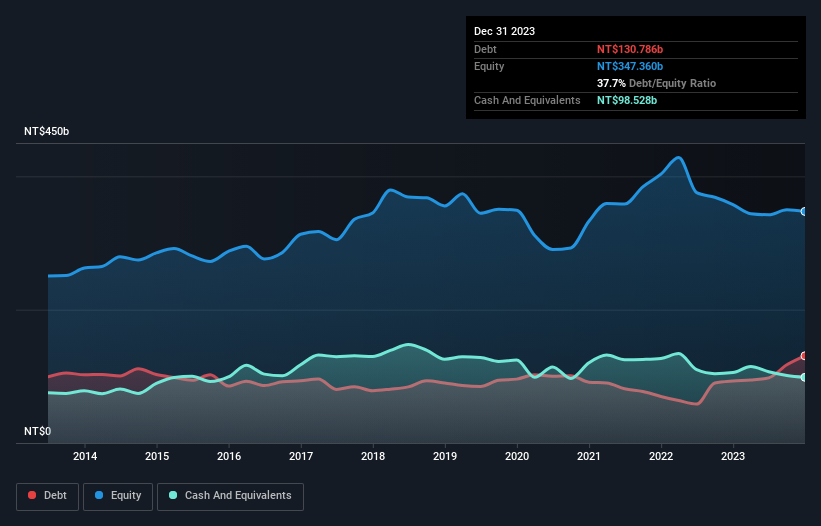
Some say volatility, rather than debt, is the best way to think about risk as an investor, but Warren Buffett famously said that 'Volatility is far from synonymous with risk.' When we think about how risky a company is, we always like to look at its use of debt, since debt overload can lead to ruin. As with many other companies Formosa Plastics Corporation (TWSE:1301) makes use of debt. But is this debt a concern to shareholders?
Why Does Debt Bring Risk?
Debt assists a business until the business has trouble paying it off, either with new capital or with free cash flow. Part and parcel of capitalism is the process of 'creative destruction' where failed businesses are mercilessly liquidated by their bankers. However, a more common (but still painful) scenario is that it has to raise new equity capital at a low price, thus permanently diluting shareholders. Of course, plenty of companies use debt to fund growth, without any negative consequences. The first step when considering a company's debt levels is to consider its cash and debt together.
View our latest analysis for Formosa Plastics
What Is Formosa Plastics's Debt?
As you can see below, at the end of December 2023, Formosa Plastics had NT$130.8b of debt, up from NT$93.1b a year ago. Click the image for more detail. However, it does have NT$98.5b in cash offsetting this, leading to net debt of about NT$32.3b.

A Look At Formosa Plastics' Liabilities
Zooming in on the latest balance sheet data, we can see that Formosa Plastics had liabilities of NT$103.1b due within 12 months and liabilities of NT$80.3b due beyond that. Offsetting this, it had NT$98.5b in cash and NT$35.1b in receivables that were due within 12 months. So its liabilities outweigh the sum of its cash and (near-term) receivables by NT$49.7b.
Since publicly traded Formosa Plastics shares are worth a very impressive total of NT$439.9b, it seems unlikely that this level of liabilities would be a major threat. However, we do think it is worth keeping an eye on its balance sheet strength, as it may change over time. When analysing debt levels, the balance sheet is the obvious place to start. But it is future earnings, more than anything, that will determine Formosa Plastics's ability to maintain a healthy balance sheet going forward. So if you want to see what the professionals think, you might find this free report on analyst profit forecasts to be interesting.
Over 12 months, Formosa Plastics made a loss at the EBIT level, and saw its revenue drop to NT$199b, which is a fall of 21%. To be frank that doesn't bode well.
Caveat Emptor
While Formosa Plastics's falling revenue is about as heartwarming as a wet blanket, arguably its earnings before interest and tax (EBIT) loss is even less appealing. Indeed, it lost NT$4.0b at the EBIT level. Considering that alongside the liabilities mentioned above does not give us much confidence that company should be using so much debt. Quite frankly we think the balance sheet is far from match-fit, although it could be improved with time. However, it doesn't help that it burned through NT$7.5b of cash over the last year. So suffice it to say we do consider the stock to be risky. When analysing debt levels, the balance sheet is the obvious place to start. However, not all investment risk resides within the balance sheet - far from it. Case in point: We've spotted 2 warning signs for Formosa Plastics you should be aware of, and 1 of them makes us a bit uncomfortable.
Of course, if you're the type of investor who prefers buying stocks without the burden of debt, then don't hesitate to discover our exclusive list of net cash growth stocks, today.
If you're looking to trade Formosa Plastics, open an account with the lowest-cost platform trusted by professionals, Interactive Brokers.
With clients in over 200 countries and territories, and access to 160 markets, IBKR lets you trade stocks, options, futures, forex, bonds and funds from a single integrated account.
Enjoy no hidden fees, no account minimums, and FX conversion rates as low as 0.03%, far better than what most brokers offer.
Sponsored ContentNew: AI Stock Screener & Alerts
Our new AI Stock Screener scans the market every day to uncover opportunities.
• Dividend Powerhouses (3%+ Yield)
• Undervalued Small Caps with Insider Buying
• High growth Tech and AI Companies
Or build your own from over 50 metrics.
Have feedback on this article? Concerned about the content? Get in touch with us directly. Alternatively, email editorial-team (at) simplywallst.com.
This article by Simply Wall St is general in nature. We provide commentary based on historical data and analyst forecasts only using an unbiased methodology and our articles are not intended to be financial advice. It does not constitute a recommendation to buy or sell any stock, and does not take account of your objectives, or your financial situation. We aim to bring you long-term focused analysis driven by fundamental data. Note that our analysis may not factor in the latest price-sensitive company announcements or qualitative material. Simply Wall St has no position in any stocks mentioned.
About TWSE:1301
Formosa Plastics
Manufactures and sells plastic raw materials, chemical fibers, and petrochemical products in Taiwan, Mainland China, and internationally.
Moderate growth potential and slightly overvalued.
Similar Companies
Market Insights
Community Narratives


